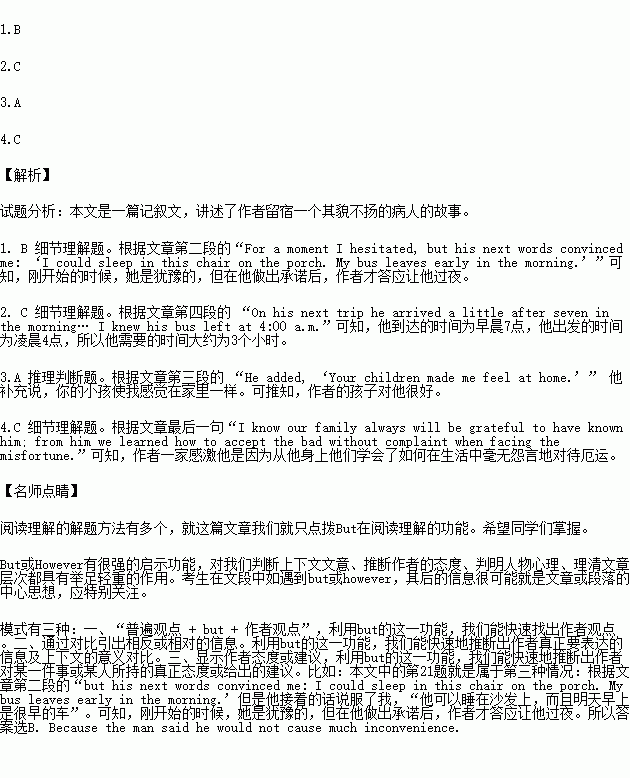题目内容
Our house was directly across the street from the clinic entrance of John Hopkins Hospital in Baltimore. We lived downstairs and rented the upstairs rooms to the patients at the clinic.
One evening as I was fixing supper, there was a knock at the door. I opened it to see a truly awful-looking man. He’s hardly taller than my eight-year-old son. “Good evening. I’ve come to see if you’ve a room. I came for a treatment this morning from the eastern shore, and there’s no bus till morning.” He told me he’d been hunting for a room since noon but with no success. “I guess it’s my face…I know it looks terrible, but my doctor says with a few more treatments…” For a moment I hesitated, but his next words convinced me: “I could sleep in this chair on the porch. My bus leaves early in the morning.”
I told him we would find him a bed. When I had finished the dishes, I talked with him. He told me he fished for a living to support his five children, and his wife, who was hopelessly crippled (残疾的) from a back injury. He didn’t tell it by way of complaint. Next morning, just before he left, as if asking a great favor, he said, “Could I come back and stay the next time?” He added, “Your children made me feel at home.”
On his next trip he arrived a little after seven in the morning. As a gift, he brought a big fish and the largest oysters (牡蛎) I had ever seen. I knew his bus left at 4:00 a.m. and I wondered what time he had to get up in order to do this for us.
In the years he came to stay overnight with us and there was never a time that he did not bring us vegetables from his garden. I know our family always will be grateful to have known him; from him we learned how to accept the bad without complaint when facing the misfortune.
1.Why did the author agree to let the man spend the night in his house at last?
A. Because the man said others refused to accommodate him.
B. Because the man said he would not cause much inconvenience.
C. Because the man said he had come from the eastern shore.
D. Because the man said he had been hunting for a room since noon.
2.How long would it take the man to travel from his home to Baltimore by bus?
A. About 1 hour. B. About 2 hours.
C. About 3 hours. D. About 4 hours.
3.From the text we can know that __________.
A. the author’s children were kind and friendly to the man
B. the man was fed up with his hard-work and his family
C. John Hopkins Hospital provided rooms for the patients to live in
D. the author and his family were thought highly of by his neighbors
4.The author’s family were grateful to know the man because __________.
A. he often brought them fish and vegetables from his garden
B. he paid them money for his staying
C. he taught them how to accept the bad without complaint
D. he stayed only overnight with the writer’s family

